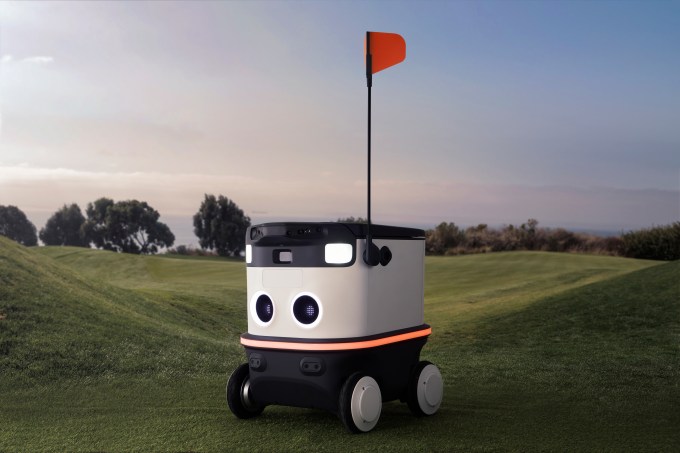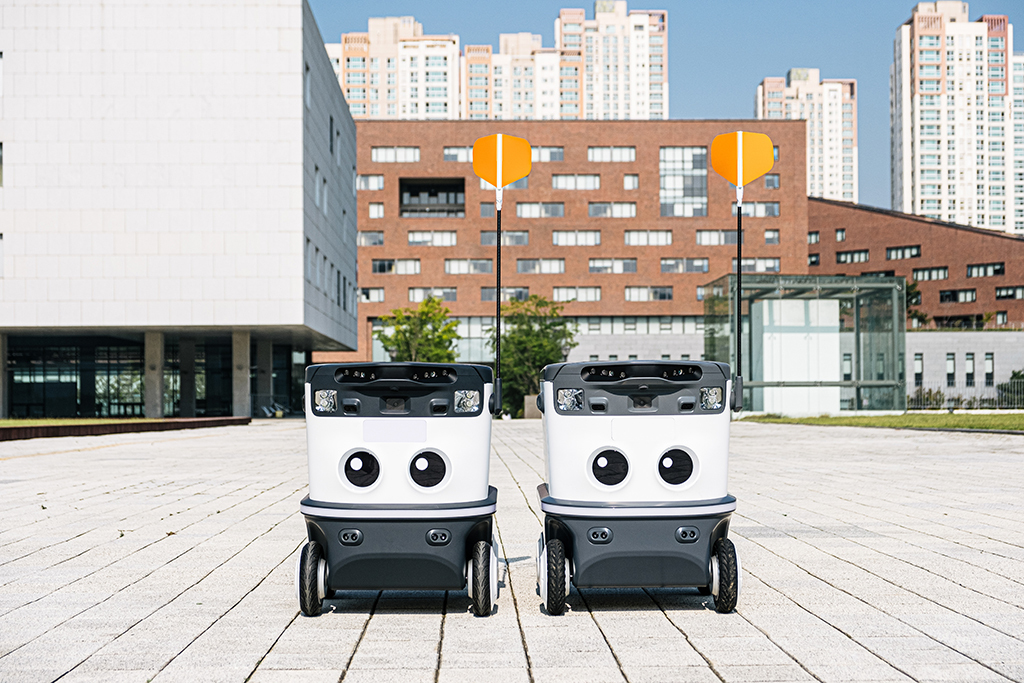Last-mile robotics startup Neubility — which makes autonomous delivery robots that work without lidar — says that it plans bump its fleet up to 400 by the end of this year, up from the 50 it currently has in circulation. The goal is part of an ambitious plan that the Seoul-based startup has laid out to boost its business after pivoting no less than five times since it was founded six years ago, but also most recently closing out a Series A of $26 million. The plans also include launching a new security robot alongside its models dedicated to delivery.
Fittingly for a startup now focused on mobility, Neubility has come a long way from its original product, a haptic glove device for video games. CEO of Neubility Sangmin Lee told TechCrunch that it’s been focused on developing hardware and software for its latest effort, delivery robots, since late 2019.
Neubility operates in a crowded industry that includes peers like Starship Technologies, Coco, Cartken and Kiwibot in the self-driving delivery robot space and Knightscope, which develops security robots. Lee told me that the startup’s differentiator is building its in-house developed products, which lead to cost-effective and low maintenance, from robot hardware and software platforms to core technologies such as visual simultaneous localization and mapping (V-SLAM) and sensor fusion.
“Many [autonomous robots companies] don’t develop their own hardware, but the essence of self-driving is having proprietary over the hardware,” Lee said.
And instead of using pricey lidar, Neubie uses V-SLAM, which allows autonomous mobile robots to perceive their surrounding environment and get visual data from the physical world; then, it builds a 3D map generated by the robots and localizes the robots in that map.
Neubility revealed the second version of its autonomous delivery robot, known as Neubie 1.5R, earlier this year at CES 2023. It claims it has the manufacturing scale to produce more than 100 delivery robots of Newbie 1.5R per month. Alongside the robot, it also offers an API Kit for robot monitoring and control solutions called ‘Neubie-GO,’ which it sells on a “RaaS” (Robotics as a Service) model.
Neubility is also extending its robot products beyond autonomous last-mile delivery, with a move into security. Earlier this month, Neubility said it would co-develop AI-powered “cop robots” with Korean telco SK Telecom and SK Shieldus, a platform that offers central monitoring, cybersecurity consulting, and dispatch services. Neubility plans to incorporate SK Telecom’s AI-powered camera and SK Shieldus’s security technology into its hardware, and the plan is to launch them later this year.
The outfit also recently raised another 2.6 million (3 billion KRW), its second close of Series A, from Samsung Venture Investment. The extension brings the startup’s total funding, and the Series A, to about $26.1 million (30 billion won) and values Neubility at approximately $76.9 million (100 billion won), according to sources familiar with the situation. The company declined to comment on the valuation.
The new funding will allow Neubility to commercialize additional robots, advance its RaaS platform and hire more staff in its R&D team. The firm has a headcount of around 100 people, including 70% focused just on R&D.
Neubility already has partnered with a string of large companies, some of them strategic investors in the startup. They include South Korea’s two largest telecoms carriers, SK Telecom and KT; Samsung Welstory, Samsung’s food distribution unit; and 42dot, the autonomous driving technology arm of Hyundai Motor.
Other backers include IMM Investment, Korean retail companies Shinsegae and Lotte, Kakao Investment and KB Investment.
It also works with 7-Eleven, where it has been helping the convenience store chain launch a food delivery service slated to go live in June. Users can order food and small items via apps from Neubility or 7-Eleven. The Neubie will help deliver the ordered items in some limited towns in a couple of cities, such as Seoul and Incheon in South Korea. Most of its customers are in B2B. It hopes that its deal with 7-Eleven will give it a shot at signing more B2C and retail customers in future.
Neubility launched a handful of pilot projects to test its autonomous delivery robots in golf courses and camping sites in the last 12 months. (The startup now operates approximately 50 robots in five golf courses and camping sites to deliver food, drinks and small items.)

Those building robots believe that the growth of e-commerce market will also propel demand for their technology. Delivery robots will be a $1.8 billion market by 2028, up from a mere $0.4 billion in 2021, per a recent report.





























Comment